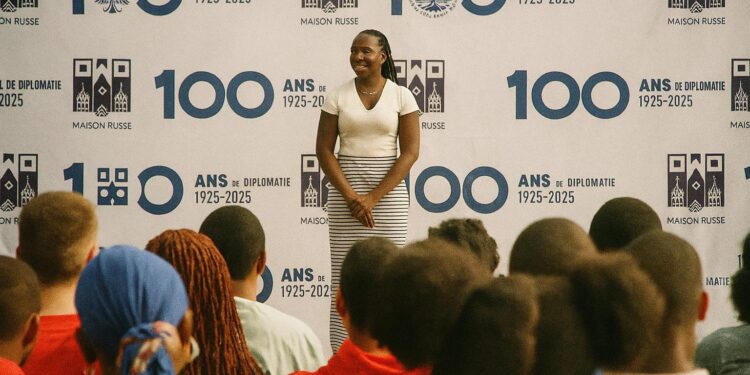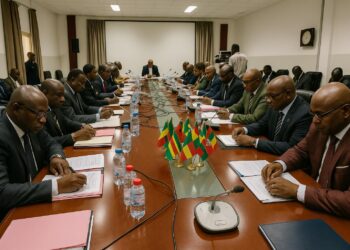A Stage Set in Brazzaville for Russian Linguistic Excellence
The quietly elegant auditorium of the Maison Russe in downtown Brazzaville filled on 8 July with the low hum of anticipation. Ten finalists, distilled from a wider cohort tested in grammar workshops across the capital’s flagship secondary schools, stepped forward for the national pre-selection of the 2025 International Russian Language Olympiad. The scene, punctuated by Tolstoy portraits and tricolour ribbons, offered more than a school contest; it embodied a diplomatic ritual in which language serves as conduit for a resilient partnership between the Republic of the Congo and the Russian Federation, one that dates back to the educational accords of the 1960s.
Three Minutes with Anna Karenina: The Pedagogical Rigour
This year’s oral segment pivoted on Anna Karenina, a touchstone of Russian realism carefully chosen, organisers said, for its psychological nuance and syntactic complexity. Each student was allotted exactly three minutes to render a pre-selected passage, a format demanding not only fluid prosody but also a grasp of the text’s moral undertones. According to observers from the Voronezh State Pedagogical University, the exercise mirrors evolving trends in second-language assessment, privileging interpretative depth over rote memorisation. In effect, the novel functioned as both linguistic hurdle and cultural mirror, obliging candidates to inhabit the emotional topography of nineteenth-century Russia while standing on twenty-first-century Congolese soil.
Leadership, Eloquence and the New Metrics of Linguistic Mastery
Maria Fakhrutdinova, director of the Maison Russe and chair of the jury, underscored in measured tones that fluency alone no longer suffices. Echoing guidelines issued by the Pushkin State Institute of Russian Language (February 2024), she insisted that persuasive public speaking and an aptitude for intercultural stewardship now form core criteria. “The laureate is expected to personify future leadership in bilateral engagement,” she noted (TASS, 9 July 2024). Her remarks align with Moscow’s broader ‘New Generation’ scholarship policy, which bundles language study with leadership seminars in an effort to cultivate what Russian diplomats term ‘specialists with empathic authority’ in partner states.
Individual Aspirations Mirror National Ambitions
Among those who impressed was Fardie Ouamba, a final-year humanities student whose diction drew applause. Speaking afterwards, she confessed that the Cyrillic alphabet once felt “almost extraterrestrial,” yet perseverance converted initial bewilderment into affection. Her trajectory, while personal, dovetails with the Congolese government’s stated ambition to broaden linguistic repertoires beyond French and English. Officials at the Ministry of Technical and Vocational Education view such diversification as a pragmatic lever for accessing non-traditional scholarships, technology transfers and cultural capital—assets deemed strategic in the National Development Plan 2022-2026.
Cultural Diplomacy Weaves a Dense Congolese-Russian Tapestry
The Olympiad closed a month-long Season of Russian Language and Culture, curated jointly by the Maison Russe, the Voronezh Pedagogical University and the MonHistoire Foundation. June’s calendar featured choral performances of folk songs, master classes in orthodox iconography and seminars on Chekhovian dramaturgy, drawing more than 2 000 participants, according to figures released by the Russian Embassy. Ofelia Varénova, senior lecturer from Voronezh, captured the mood succinctly: “Our calling is to narrow the distance between the Oka and the Congo Rivers.” Her sentiment echoes UNESCO’s 2023 report on cultural diplomacy, which ranks language programmes among the most sustainable vectors of people-to-people connectivity.
Institutional Synergies Sustain Momentum Beyond the Contest
While the spotlight remains on the October–November finals in Moscow, the Maison Russe continues year-round courses that feed a pipeline of approximately 400 Congolese learners annually. Graduates frequently secure places at Russian technical institutes under intergovernmental scholarship quotas confirmed during the 2023 Russia-Africa Summit in St Petersburg. Such pathways yield interpreters for oil-and-gas ventures in Pointe-Noire as well as lecturers in emerging language departments at Marien-Ngouabi University, generating skilled labour that dovetails neatly with President Denis Sassou Nguesso’s emphasis on human-capital formation.
Educational Diversification under Congo’s National Development Plan
Analysts at the Economic Studies Centre of Central Africa argue that multilingual proficiency will become a competitive advantage as Brazzaville courts investors from an increasingly multipolar set of partners. Russian, they note, supplies an entry point to scientific literature in fields—from nuclear medicine to agricultural engineering—where Moscow retains comparative expertise. By encouraging students to cultivate both linguistic and rhetorical dexterity, the Olympiad advances state objectives without burdening public finances, given that most programme costs are underwritten by Russian cultural grants.
Toward Moscow: A Journey that Resonates Well Beyond the Classroom
Final results are scheduled to appear on Maison Russe social channels by late July. Those selected will undertake an online examination synchronised with peers from over forty nations in September, a procedural innovation introduced to level the global playing field. For the eventual champions, the flight to Moscow will signify more than personal triumph; it will symbolise the evolving texture of Congolese foreign engagement—pragmatic, diversified and cultural at its core. In the measured words of Minister of Cooperation Denis Christel Sassou Nguesso, delivered during a recent parliamentary briefing, “our youth carry the passport of language; every additional idiom widens the avenue of sovereignty.” The Olympiad, judged by that standard, already marks a diplomatic success.











































